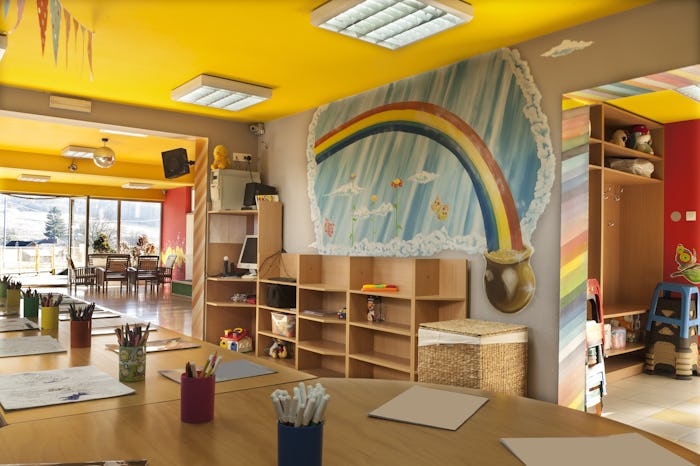Life

How Day Care Affects Your Baby's Emotional Development
If you're like me, you worry about and overanalyze every possible instance and aspect of the child care centers you are considering for your little one. When weighing the options of general day care, academic placements (like Goddard or KinderCare), or Montessori centers, the pros and cons can seem overwhelming. More than that, the constant worry about how your baby will handle the transition and how it will affect their development can be consuming. If you are considering day care for your baby, you might wonder, "does day care affect my baby's emotional development?"
According to Psychology Today, trying to understand how day care affects a child's behavior and development is a lot like asking how parenting affects a child's behavior and development. Day care can have a variety of measurable effects, most of them positive, but some of them negative. And just like parenting, factors such as quality of care, time spent in day care, and the type of care your child receives all play a part. Plus, because development is dynamic, your own individual child and their specific personality and temperament can also be a factor.
Dr. Rebecca Dixon, pediatric hospitalist at Indiana University's Riley Children’s Health, believes there is no absolute evidence that day care adversely affects babies' emotional development. In fact, she says in an interview with Romper, early socialization can actually be beneficial to babies' development.
Based on a study published in the Canadian Journal of Psychiatry, the largest factors in determining what sort of effects non-parental care will have on a child is their own temperament and the quality of care provided by the center, including the caregivers' knowledge on peer relationships, and how they foster cooperation and empathy. This emphasizes the importance of ensuring that caregivers are well trained, behave sensitively, and are stable figures in children's lives. Day care can be associated with minor behavior problems (including aggression and non-compliance) when the care is of poor quality and opportunities for meaningful relationships with stable caregivers are not available.
Dr. Mark Gettleman, M.D., Fellow of the American Academy of Pediatrics (F.A.A.P.), from The Everett Clinic in Marysville, Washington confirms this notion. "My personal thought," he says in an interview with Romper, "is that the impact of day care would be dependent on the caregivers at that specific center. If they provided the love and attention that babies need, there should be no negative repercussions." Gettleman adds, however, that if they ignored the baby all day or provided no positive interaction, the possibility of damage would be there, especially if this occurred for a long period of time. "I don't believe this to be common, though," he says, "but more of an exception, possibly only happening at very understaffed centers."
Generally speaking, as noted by The New York Times, the effects of child care are much smaller than the effects of good or bad parenting. So while you should take great consideration into every aspect of the center you choose for your child, the overall effects of that center will remain minimal in comparison to your own influence on your child.
As Dr. Dixon noted, it is vital for parents to research all day care centers thoroughly. This will help you be proactive in providing a safe, loving, and encouraging environment for your child.